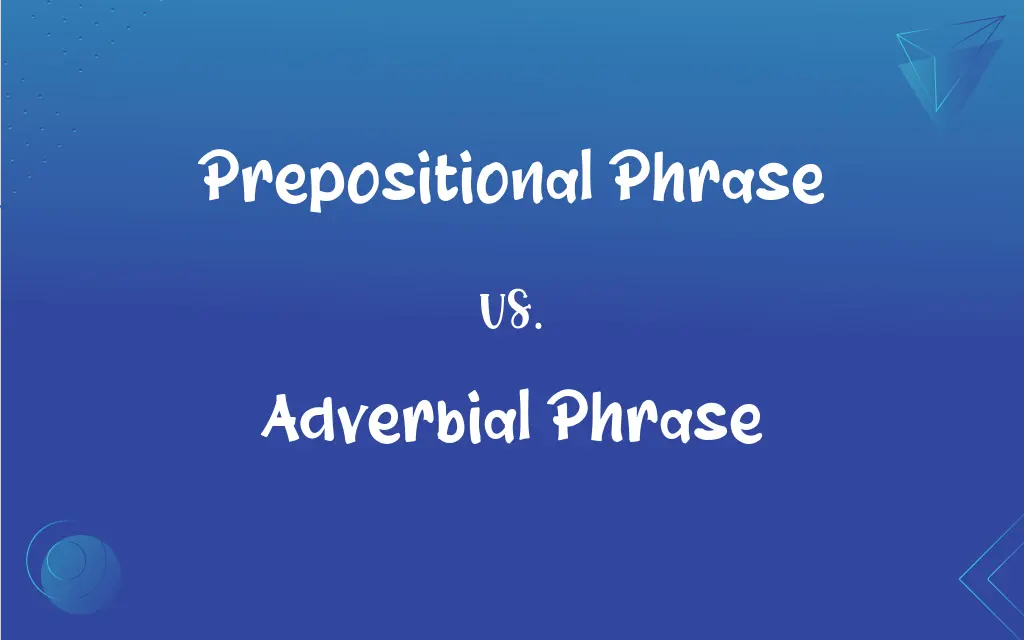Prepositional Phrase vs. Adverbial Phrase: What's the Difference?
Edited by Aimie Carlson || By Harlon Moss || Published on January 21, 2024
A prepositional phrase provides additional information about a noun, while an adverbial phrase modifies a verb, adjective, or other adverb.

Key Differences
A prepositional phrase begins with a preposition and ends with a noun or pronoun, called the object of the preposition. It functions as an adjective or adverb, providing more detail about nouns or pronouns. An adverbial phrase, on the other hand, is a group of words that functions as an adverb, modifying a verb, an adjective, or another adverb to convey manner, place, time, frequency, condition, degree, or reason.
In terms of structure, prepositional phrases typically consist of a preposition followed by a noun or pronoun. For example, in the phrase "on the table," "on" is the preposition, and "table" is its object. Adverbial phrases may include an adverb along with other words that expand on the adverb's meaning, such as “very quickly” or “with great caution.”
Prepositional phrases often provide spatial or temporal context, like "under the bridge" or "during the meeting." These phrases can act as adjectives, modifying nouns, or as adverbs, modifying verbs. Conversely, adverbial phrases modify verbs to add detail about how, when, where, or to what extent an action occurs, as in “ran quickly” or “spoke softly.”
The function within a sentence also distinguishes these phrases. A prepositional phrase can act as a subject, object, or complement, while an adverbial phrase primarily modifies verbs and sometimes adjectives or other adverbs, answering questions like how, when, where, and why.
Usage in a sentence is another differentiator. A prepositional phrase can provide necessary information about the subject or object, like "The book on the shelf is mine." In contrast, an adverbial phrase often adds optional information to the verb, as in "He ran quickly," where "quickly" is an adverbial phrase enhancing the verb "ran."
ADVERTISEMENT
Comparison Chart
Basic Function
Modifies nouns and pronouns
Modifies verbs, adjectives, and adverbs
Common Starters
Prepositions (on, in, under, over)
Adverbs or adverbial expressions
Position in Sentence
Often near the noun it modifies
Usually close to the word it modifies
Example Uses
Spatial/temporal context, e.g., "in the garden"
Manner, time, place, e.g., "quickly ran"
Sentence Role
Can act as subject, object, or complement
Primarily modifies actions or qualities
ADVERTISEMENT
Prepositional Phrase and Adverbial Phrase Definitions
Prepositional Phrase
A phrase beginning with a preposition and ending with a noun or pronoun.
In the garden, the flowers bloom.
Adverbial Phrase
Adds emphasis or detail to the verb or adjective it modifies.
She spoke with great enthusiasm.
Prepositional Phrase
Serves as an adjective or adverb in a sentence.
The cat under the table is sleeping.
Adverbial Phrase
A group of words acting as an adverb to modify a verb, adjective, or adverb.
She sang very beautifully.
Prepositional Phrase
Can function as a subject, object, or complement in a sentence.
On the table was all we needed.
Adverbial Phrase
Can modify the entire sentence or a part of it.
To my surprise, the test was easy.
Prepositional Phrase
Provides information about location, time, or direction.
After the movie, we went to dinner.
Adverbial Phrase
Often answers questions about the action or quality it modifies.
They worked until midnight.
Prepositional Phrase
Adds contextual detail to a noun or verb.
The painting above the fireplace is ancient.
Adverbial Phrase
Provides information about how, when, where, or to what extent.
He ran incredibly fast.
FAQs
Can a prepositional phrase act as an adverb?
Yes, it can also modify a verb, adjective, or adverb, functioning as an adverb in a sentence.
What is an example of a prepositional phrase?
"In the garden," where "in" is the preposition and "the garden" is the object.
How do you identify a prepositional phrase?
Look for a preposition followed by a noun or pronoun with any modifiers.
Can a prepositional phrase act as an adjective?
Yes, it can describe a noun or pronoun, functioning as an adjective in a sentence.
How do prepositional phrases enhance writing?
They add detail and clarity to descriptions and actions.
What is a prepositional phrase?
A prepositional phrase is a group of words consisting of a preposition, its object, and any words that modify the object.
Can a sentence start with a prepositional phrase?
Yes, for example, "Under the bed, the cat slept peacefully."
What is an example of an adverbial phrase?
"Very quickly," where "very" modifies the adverb "quickly."
What is an adverbial phrase?
An adverbial phrase is a group of words that modifies, as a single unit, a verb, adjective, another adverb, or a whole clause.
Can a prepositional phrase be the subject of a sentence?
No, it acts as an adjective or adverb but not as the subject.
Can an adverbial phrase be at the beginning of a sentence?
Yes, for example, "Without hesitation, she answered the question."
Can an adverbial phrase contain a preposition?
Yes, if the prepositional phrase functions as an adverb in the sentence.
How does an adverbial phrase differ from an adverb?
An adverbial phrase contains more than one word, whereas an adverb is just one word.
Do prepositional phrases always contain nouns?
Typically, yes, but they can also contain pronouns or noun phrases.
How do adverbial phrases enhance writing?
They add depth and detail to the manner, place, time, frequency, or degree of actions or characteristics.
Can a prepositional phrase be removed without changing the sentence's meaning?
Often, but removing it may reduce the detail or clarity.
Can an adverbial phrase act as a subject?
No, it cannot function as a subject.
Do adverbial phrases only modify verbs?
No, they can also modify adjectives, other adverbs, and whole clauses.
How do you identify an adverbial phrase in a sentence?
Look for a group of words that modifies a verb, adjective, or adverb but doesn't contain a subject and verb.
Can adverbial phrases be complex?
Yes, they can be complex and contain multiple words or even nested phrases for more nuanced modification.
About Author
Written by
Harlon MossHarlon is a seasoned quality moderator and accomplished content writer for Difference Wiki. An alumnus of the prestigious University of California, he earned his degree in Computer Science. Leveraging his academic background, Harlon brings a meticulous and informed perspective to his work, ensuring content accuracy and excellence.
Edited by
Aimie CarlsonAimie Carlson, holding a master's degree in English literature, is a fervent English language enthusiast. She lends her writing talents to Difference Wiki, a prominent website that specializes in comparisons, offering readers insightful analyses that both captivate and inform.






































































